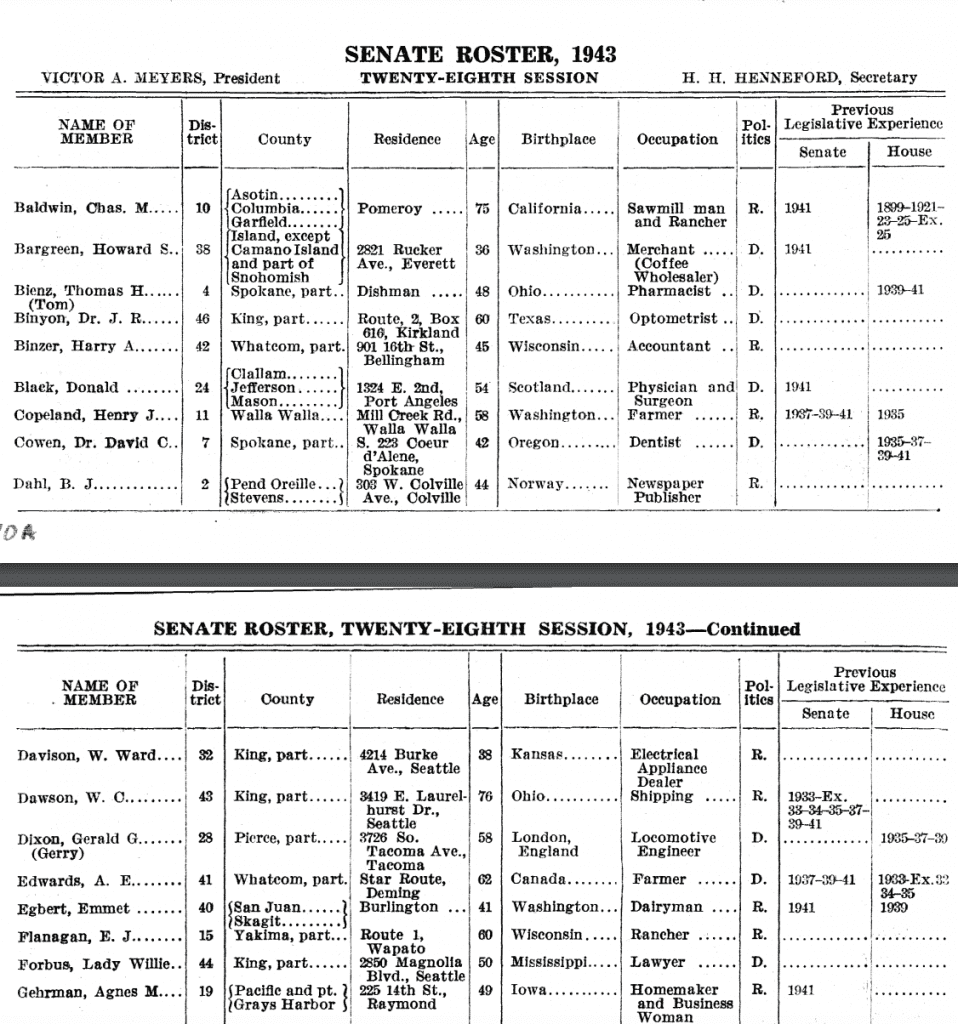
Notes From Olympia: Oct. 29, Interim Updates
Included in this edition: Breaking News, Trivia, Policy Updates, And lots of resources!
Breaking News – Potential Agreement on Build Back Better
On Thursday, Oct. 28, the White House announced a negotiated agreement on the Build Back Better Framework. The agreement contains sweeping investments and policy changes for child care and federal universal preschool. As we go to “print” at 7 p.m. Thursday night, it does not appear that a vote is imminent, but that could change. We will continue to closely monitor this situation and provide further details when they are available.
Trivia!
As we are likely approaching a second “unusual” legislative session (see more on that below), I got to thinking if there were points in history when the typical legislative schedule was adjusted to reflect world affairs. Specifically, I wondered whether the Washington State Legislature had a disrupted legislative session during World War II. Did the Washington Legislature make any adaptations during the Second World War?
Policy Updates
Transitions. Typically, resignations and retirements by elected officials tend to happen at the end of a two-year legislative session. However, this year is an anomaly, with several announcements. This week, Republican Secretary of State Kim Wyman announced her resignation as of Nov. 19 to join President Joe Biden’s Administration as his Senior Election Security Lead. Governor Jay Inslee will select someone to fill the vacancy and, in November 2022, the voters will choose a candidate to finish out Secretary Wyman’s term which ends in 2024. According to an Oct. 26 tweet by NPR’s Austin Jenkins, the last time a statewide office appeared on a ballot during an “off year” was in 1975 due to another vacancy.
In the past few weeks, Senators Jeannie Darneille (Democrat, Pierce County) and Ann Rivers (Republican, Clark County) announced their resignations. Senator Darneille moved to the Department of Corrections to serve as the Assistant Secretary for the Women’s Prison Division and Senator Rivers accepted a position with the City of Longview to serve as its Community Development Director. Their respective County Councils will select both Senators’ replacements from the top three nominees chosen by local Precinct Committee Officers. Senator Darneille served as the Chair of the Senate Human Services, Reentry and Rehabilitation Committee, so a new Chair for that committee will be identified shortly. Finally, Senator David Frockt (Democrat, King County) announced he will retire following the 2022 legislative session. Senator Frockt has served as the Vice Chair of the Senate Ways and Means Committee, where he oversaw the Capital Budget and was instrumental in securing funding for the Early Learning Facilities Fund.
Legislative Committee Days will be Virtual. Due to continued uncertainty with COVID-19, November committee days will again be virtual, with the Senate convening for committee work sessions on Nov. 15-17 and the House on Nov. 18-19.
Committee work sessions of note for early learning include:
- Senate Ways and Means on Nov. 15 at 3:30 p.m. Topics include revenue and caseload and COVID-19 response funding.
- Senate Behavioral Health Subcommittee on Nov. 16 at 1:30 p.m. The agenda includes an overview of the report and recommendations from the Children and Youth Behavioral Health Workgroup.
- Senate Early Learning and K-12 on Nov. 17 at 1:30 p.m. The focus of this work session is early learning and will include an update on the Fair Start for Kids Act implementation, integrated preschool and early learning opportunities for children with disabilities.
- House State Government on Nov. 18 at 8 p.m. Work session includes a focus on the creation of the Office of Equity.
- House Appropriations on Nov. 18 at 3:30 p.m. Topics include a preview of the 2022 legislative session fiscal issues.
Each work session will be available for viewing on TVW.org. Remember that if you miss the sessions live, you can always replay them using TVW’s archives tab.
2022 Legislative Session. The 2022 legislative session will be here before we know it, with the short, 60-day session scheduled to start on Monday, Jan. 10. The top question I get is whether the 2022 legislative session will be in-person, virtual, or hybrid. The short answer is – we do not know yet. We expect announcements from the Senate and House in early November and we will report on their plans in the next Notes From Olympia.
State Revenue Forecast. The state’s revenues continue to outpace projections, with the Major State General Fund dollars for the Sept. 11 – Oct. 10 period coming in $152.7 million above the September forecast. This represents an 8.2% increase. The next quarterly revenue forecast will be on Nov. 19 and that figure will inform the Governor’s proposed Supplemental Budget that he will release in mid-late December.
On Oct. 1, the Governor’s Office of Financial Management announced an agreement with the state employee union to provide $412.2 million ($241.7 million General Fund) in pay increases for state employees. This agreement will provide for a 3.25% pay increase beginning July 1 2022, as well as a graduated lump-sum payment, with workers making lower wages receiving a larger lump-sum. Like with all collective bargaining agreements, the Legislature cannot alter the agreement; they either can approve or disapprove the terms.
Fair Start for Kids Act Updates/Resources
The Fair Start for Kids Act was a significant piece of legislation with many components. So many that I have trouble keeping all the details in my head. Here are some great resources to explain what the Fair Start for Kids Act contains, the various funding amounts and when provisions go into effect.
Our friends at MomsRising developed an amazing toolkit designed as a resource for families navigating the child care subsidy process. It contains Frequently Asked Questions, describes the new co-payment structure and, importantly, outlines the materials that families will need to apply. This is a resource to share far and wide. It is currently available in English, but they expect to offer it in Spanish shortly.
The Department of Children, Youth and Families has a webpage dedicated to Fair Start for Kids Act details. Additionally, the agency has information on Child Care Stabilization Grants available in English, Spanish and Somali.
Licensed child care centers, family child care homes, school-age providers and outdoor nature-based care providers with open licenses in good standing are eligible for Child Care Stabilization Grants. License capacity determines the grant amount. Providers are eligible to apply for one stabilization grant and applications will be accepted through June 2022 with applications reviewed and paid out monthly.
Finally, Start Early WA has developed the following budget and policy analysis pieces:
- Allocation of Federal COVID-19 Relief for Early Learning: see how the state allocated the federal COVID-19 relief dollars (CARES, CRRSA, ARPA, and CRF) to support early learning priorities.
- Summary of 2021-23 Operating and Capital Budget Investments for Early Learning: an overview of Washington’s investments in early learning for the current biennium.
- Summary of Key Provisions of the Fair Start for Kids Act: a summary of the main elements passed in the Fair Start for Kids Act.
Start Early WA is on Twitter!
Follow us at @StartEarlyWA on “the Twitter.” We look forward to engaging, sharing, amplifying – and other positive, active verbs!
Early Learning Facility Fund Grant Application Process is Open
The Department of Commerce has opened the application process for the 2021-23 Early Learning Facilities Funds to establish or expand spaces for ECEAP and Working Connections Child Care. Pre-application responses are due by noon Nov. 16 and the application process closes at 5 p.m. on Dec. 1.
Trivia Answer
The short answer is no; the Washington State Legislature did not adjust its schedule during World War II, despite calls for an abbreviated session due to the war. In fact, the Legislature worked the full 60 days, adjourning at 5 a.m. on day 61. Not surprisingly, legislative news was relegated to the middle sections of newspapers as the war dominated headlines.
I found a fascinating resource authored by former House Member (and later lobbyist) Don Brazier published by the Washington State Senate in 2000 called “History of the Washington Legislature 1854-1963.” Within this document, Brazier chronicles legislative life during World War II and I thought I would share some of the interesting tidbits from this era.
Back in the early 1940s, the Washington State Legislature only met during odd-numbered years and only for 60-day sessions. From the time the Legislature adjourned in 1941 to their return in 1943, the United States had entered World War II. With the country at war, the political climate in Washington state became more conservative, with voters striking down an income tax and the Democratic majority in the Legislature slipping. In 1940, the voters had turned down a proposed increase in salaries for elected officials. The 1940 election saw several electoral challenges, including one challenge due to a candidate’s brief membership in the Communist party in the 1930s.
The issue of elected official compensation in the 1940s had ramifications once World War II hit. At that time, legislators were only compensated $5 a day and only while they were in session (totaling $300 a year, every other year), plus mileage for one round-trip back to the district. Hotel rooms in Olympia cost $3.50 a day, and private home rentals were between $1.50-$2.00 a day.
During World War II, housing in Thurston County became scarcer as more military families moved to the area with the expansion of Fort Lewis. There were stories of price gouging for the limited available housing when the Legislature returned in 1943 as “well heeled” lobbyists gobbled up the limited, nicer hotel rooms. As a result, there became a community campaign for private homes to open their doors to legislators and staff so they would have a place to sleep.
Eventually, the Legislature voted to allow themselves a $5 per day per diem (after providing receipts). This action was highly controversial, particularly during wartime. There is a tale that during a breakfast meeting among three sitting State Senators at an Olympia diner, a discussion about the per diem became so heated, the Senators came to blows!
In addition to housing and compensation drama, there was also controversy over committee assignments in the Senate, leading to nine Democrats joining with 18 Republicans for a de facto conservative coalition that remained on and off for several legislative sessions. (Reminiscent of the “Majority Coalition Caucus” that formed in 2013 when two Senate Democrats joined 23 Senate Republicans to form a Majority).
The 1943 Legislature eventually got down to business, passing, among other items, a bill granting equal pay to women and men in recognition of the growing number of women in the workforce due to the war. Additionally, they provided financial relief to cities whose municipal services were strained by surging populations due to wartime deployments and also focused on executive war powers, with a Democratic Legislature reluctant to give broader authority to the Republican Governor (which sounds very similar to current debates about the executive authority during this pandemic).
Finally, for the first time since 1933, the Legislature met in special session starting on Feb. 28 1944, for a quick six-day session to make accommodations so service members could vote.
More than you needed or wanted to know, but interesting (at least to me). My deep dive also unearthed the 1943 Senate roster. Noting four of the 17 listed Senators were born outside of the United States, only three were born in Washington State and some of their home addresses were listed. Such facts are all rarities today.

About the Author

Erica Hallock
Director, Policy & Advocacy, Start Early Washington
Erica Hallock serves as the Director of Policy and Advocacy for Start Early Washington. She has worked in early childhood, health and human services policy in both California and Washington state.
Contact Us
Connect with our team to learn more about our work or discuss how we can support policy and advocacy work for your organization.
Washington State Hub
Learn more about our work in Washington state and access relevant resources and publications.
